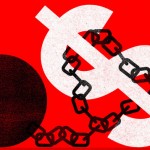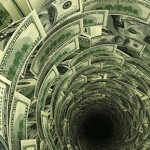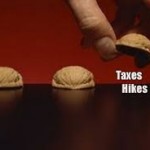
Podcast discussion on how the Federal Reserve is destroying consumer savings, how central banks will be to blame for the coming bond collapse, how trying to keep gold & silver prices ‘corralled’ is part of the official plan.
 11/07/2014 - Chris Martenson on Financial Repression
11/07/2014 - Chris Martenson on Financial Repression
Podcast discussion on how the Federal Reserve is destroying consumer savings, how central banks will be to blame for the coming bond collapse, how trying to keep gold & silver prices ‘corralled’ is part of the official plan.
 11/07/2014 - The Amphora Report’s John Butler Talks Financial Repression
11/07/2014 - The Amphora Report’s John Butler Talks Financial Repression
Special Guest: John Butler – Amphora
“The whole point of financial repression is to make it difficult or impossible for an investor to protect themselves”
John feels Financial Repression “is now extremely broad based (globally) and in fact you have to look very closely to find countries not actively pursuing some mix of Financial Repression policies.”
A NEGATIVE SUM GAME
Butler has argued in his Amphora Report that competitive currency debasement is “is not a zero sum game but rather a negative sum game because policy makers don’t realize that by trying to devalue against each other, unseen they are undermining the very credibility of unbacked fiat currencies generally.”
Increasing the BRICS are “becoming increasingly wary of where all this is going and as a consequence are diversifying not only their fiat currency reserves but are diversifying into gold, oil fields and real assets generally.”
HOW INVESTORS PROTECT THEMSELVES
“The only free lunch in economics is DIVERSIFICATION. The problem is that in a world of Financial Repression, the way you diversify yourself is very different than a world where financial represion is not an issue.”
“There is no way out but Currency Debasement”
 11/07/2014 - Chris Martenson Talks Financial Repression
11/07/2014 - Chris Martenson Talks Financial Repression
Special Guest: Chris Martenson PhD – PeakProsperity
FINANCIAL REPRESSION
“When governments get into too much debt there are only so many ways to get themelves out from under the debt.” There is:
In reality, the third is the only politically viable solution. Financial Repression ” the cornerstone involves taking a little from everybody and giving it to a couple of favored parties”. To do this involves three basic elements:
THE COMING CRISIS
True wealth NEVER gets destoyed, it only gets transferred!”
Chris points out that wealth is never destroyed. but rather it is the claims on wealth which are destroyed during a crisis. “A profound currency accident is coming” according to Chris where he “would not be surprised to see the Yen be completel obliterated just like the the Zimbabwe dollar.” His strong recommendations are:
Wealth can no longer be stored in paper currency or “paper” claims in a Fiat Currency System.
 11/06/2014 - Japan Committed To Financial Repression
11/06/2014 - Japan Committed To Financial Repression
 “Whether or not BoJ governor Haruhiko Kuroda’s ‘shock and awe’ will provide the necessary uplift to the economy remains to be seen but he has certainly committed himself to ‘financial repression’ more than any other nation. Furthermore, with the Fed ending its QE program, Japan is at the forefront of leading the currency wars.”
“Whether or not BoJ governor Haruhiko Kuroda’s ‘shock and awe’ will provide the necessary uplift to the economy remains to be seen but he has certainly committed himself to ‘financial repression’ more than any other nation. Furthermore, with the Fed ending its QE program, Japan is at the forefront of leading the currency wars.”
– Sean Darby, strategist at investment bank Jefferies
LINK HERE to the source article
 11/05/2014 - Tim Price on Into The Unknown: Central Bank Financial Repression Will Go On …
11/05/2014 - Tim Price on Into The Unknown: Central Bank Financial Repression Will Go On …
 In his latest letter, Tim Price stresses the price distortions in the financial markets .. emphasizes that although Federal Reserve asset purchases have abated (for now), central bank financial repression “will go on” .. on investments, Price sees bond prices as being “grotesquely expensive”, continues to like only quality listed businesses trading at or well below a fair assessment of their intrinsic worth .. “Pretty much everything else amounts to nothing more than paper, prone to arbitrary gusts from some very powerful, and very windy, bureaucrats. We note also that former Fed chairman Alan Greenspan, no doubt looking to polish his legacy, managed to front-run the Fed’s QE announcement by pointing to the merits of gold within a government-controlled, fiat currency system. Strange days indeed.”
In his latest letter, Tim Price stresses the price distortions in the financial markets .. emphasizes that although Federal Reserve asset purchases have abated (for now), central bank financial repression “will go on” .. on investments, Price sees bond prices as being “grotesquely expensive”, continues to like only quality listed businesses trading at or well below a fair assessment of their intrinsic worth .. “Pretty much everything else amounts to nothing more than paper, prone to arbitrary gusts from some very powerful, and very windy, bureaucrats. We note also that former Fed chairman Alan Greenspan, no doubt looking to polish his legacy, managed to front-run the Fed’s QE announcement by pointing to the merits of gold within a government-controlled, fiat currency system. Strange days indeed.”
LINK HERE to the source article
 11/04/2014 - Governments Using Financial Repression To Pay Down Debt
11/04/2014 - Governments Using Financial Repression To Pay Down Debt
 “Financial repression always consists of a combination of different measures, which lead to a significant narrowing of the universe of investable assets for investors. Money, which in a more liberal investment environment would have flowed into other asset classes, is channeled in a different direction. The goal of financial repression is an indirect reduction of government debt by means of the targeted manipulation of the cost of government debt, most of the time accompanied by steady inflation. Financial repression is ultimately a government-imposed transfer of wealth .. A preferably “quiet debt reduction” is supposed to be achieved by the following measures:
“Financial repression always consists of a combination of different measures, which lead to a significant narrowing of the universe of investable assets for investors. Money, which in a more liberal investment environment would have flowed into other asset classes, is channeled in a different direction. The goal of financial repression is an indirect reduction of government debt by means of the targeted manipulation of the cost of government debt, most of the time accompanied by steady inflation. Financial repression is ultimately a government-imposed transfer of wealth .. A preferably “quiet debt reduction” is supposed to be achieved by the following measures:
One of the most important goals of financial repression is to hold nominal interest rates below the rate of price inflation. This lowers the government’s interest expenses and contributes to a reduction in the real value of the debt burden.
– Ronald-Peter Stoferle, Incrementum AG Liechtenstein
LINK HERE to the source article
 11/04/2014 - STRANGE THINGS ARE HAPPENING IN THE BOND MARKET!
11/04/2014 - STRANGE THINGS ARE HAPPENING IN THE BOND MARKET!
“There is a very simple lesson that when the markets finally break through the manipulation they move to price in deflation and not inflation. This is key because it means financial repression has failed.”Analyst Russell Napier
The Economist’s Buttonwood column described it as:
“Letting go of Daddy’s hand,” and cautioned, “[W]e may indeed get to see QE4 rolled out. Daddy might have let go of the market’s hand for the moment but he’s still close by.”
“That coinage nicely speaks to the juvenilisation to which markets have been reduced during six long years of:
Financial Repression,
Interest Rate Manipulation, and
The Unprecedented Expansion of central bank balance sheets.
Only the asset purchases have abated (for now): the Financial Repression, one way or another, will go on. Whether the asset purchases have really disappeared or merely been suspended will be a function of how risk markets behave over the coming months and years.
And
“Although our crystal ball is no more polished than anyone else’s, we would not be surprised to see petulant markets rewarded with yet more infusions of sweets. Our fundamental views are clear:
LINK HERE to the source article
 11/04/2014 - IT BEGINS! GERMAN BANK CHARGING NEGATIVE INTEREST TO RETAIL CUSTOMERS
11/04/2014 - IT BEGINS! GERMAN BANK CHARGING NEGATIVE INTEREST TO RETAIL CUSTOMERS
On November 1st, the first European bank has passed along these negative interest rates to its retail customers.
So if you maintain a balance of more than 500,000 euros at Deutsche Skatbank of Germany, you now have the privilege of paying 0.25% per year… to the bank.
We’ve already seen this at the institutional level: commercial banks in Europe are paying the ECB negative interest on certain balances.
And large investors are paying European governments negative interest on certain bonds.
Now we’re seeing this effect bleed over into retail banking.
It’s starting with higher net worth individuals (the average guy doesn’t have half a million euros laying around in the bank). But the trend here is pretty clear – FINANCIAL REPRESSION is coming soon to a bank near you.
It almost seems like an episode from the Twilight Zone… or some bizarre parallel universe. That’s the investment environment we’re in now.
Bottom line: if you’re responsible with your money and set some aside for the future, you will be penalized. If you blow your savings and go into debt, you will be rewarded.
If we ask the question “cui bono”, the answer is pretty obvious: heavily indebted governments benefit substantially from zero (or negative) rates.
Case in Point:
the British government just announced that they would pay down some of their debt that they racked up nine decades ago.
In 1927, then Chancellor of the Exchequer Winston Churchill issued a series of bonds to consolidate and refinance much of the debt that Britain had racked up from World War I and before.
This debt is still outstanding to this day. And the British government is just starting to pay it down– about $350 million worth.
Think about it– $350 million was a lot of money in 1927. Thanks to decades of inflation, it’s practically a rounding error on government balance sheets today.
This is why they’re all so desperate to create inflation… and why they’ll stop at nothing to make it happen. (It remains to be seen whether they’ll be successful, but they are willing to go down swinging…)
What’s even more extraordinary is how they’re trying to convince everyone why inflation is necessary… and why negative rates are a good thing.
On the ECB’s own website, they say that negative interest rates will “benefit savers in the end because they support growth and thus create a climate in which interest rates can gradually return to higher levels.”
I’m not sure a more intellectually dishonest statement could be made; they’re essentially telling people that the path to prosperity is paved in debt and consumption, as opposed to savings and production.
LINK HERE to the source article
 11/03/2014 - GOVERNMENT PAPER REFERS TO FINANCIAL REPRESSION AS THE “LIQUIDATION TAX”
11/03/2014 - GOVERNMENT PAPER REFERS TO FINANCIAL REPRESSION AS THE “LIQUIDATION TAX”
“THE LIQUIDATION OF GOVERNMENT DEBT”
“The saving (or “revenue”) to the government or the “liquidation effect” or the “financial repression tax” is the real (negative) interest rate times the “tax base,” which is the stock of domestic government debt outstanding.”
Working Paper 16893, National Science Foundation Grant No. 0849224
ESTIMATE 3-4% of US GDP Y-o-Y
“Such annual deficit reduction quickly accumulates (even without any compounding) to a 30-40 percent of GDP debt reduction in the course of a decade”
“Historically, periods of high indebtedness have been associated with a rising incidence of default or restructuring of public and private debts. A subtle type of debt restructuring takes the form of “financial repression.” Financial repression includes:
“In the heavily regulated financial markets of the Bretton Woods system, several restrictions facilitated a sharp and rapid reduction in public debt/GDP ratios from the late 1940s to the 1970s. Low nominal interest rates help reduce debt servicing costs while a high incidence of negative real interest rates liquidates or erodes the real value of government debt. Thus, financial repression is most successful in liquidating debts when accompanied by a steady dose of inflation. Inflation need not take market participants entirely by surprise and, in effect, it need not be very high (by historic standards). For the advanced economies in our sample, real interest rates were negative roughly ½ of the time during 1945-1980. For the United States and the United Kingdom our estimates of the annual liquidation of debt via negative real interest rates amounted on average from 3 to 4 percent of GDP a year.“
 11/02/2014 - Inflation – Deflation Tug of War Deflation: Market Forces Inflation: State-Sanctioned Inflationism & Financial Repression
11/02/2014 - Inflation – Deflation Tug of War Deflation: Market Forces Inflation: State-Sanctioned Inflationism & Financial Repression
“The markets want deflation, and they want the world’s unsustainable debt pile to be reduced. There are three ways to reduce the debt pile. One is to engineer sufficient economic growth (no longer feasible, in our view) to service the debt. The second is to default (which, in a debt-based monetary system, amounts to Armageddon). The third: explicit, state-sanctioned inflationism, and financial repression. The reason why markets have become so volatile is that from day to day, deflationary and inflationary forces are duking it out, and neither side has yet been convincingly victorious. Who ultimately wins? We think we know the answer, but the outcome will likely be a function of politics as much as investment forces.”
– Tim Price
LINK HERE to the source article
 11/02/2014 - Now the Swedish Central Bank Lowers Interest Rates to 0% – Financial Repression is the Government’s Solution
11/02/2014 - Now the Swedish Central Bank Lowers Interest Rates to 0% – Financial Repression is the Government’s Solution
“The RIKSBANK strikes again! This is the most important story of the day. The Swedish Central Bank lowered its lending rate to ZERO in an effort to halt a slide into deflation .. Deflation is a very dangerous economic outcome for a country with a large public and private debt load. It is why I keep discussing the impact of 1937 on the work of Ben Bernanke and why he obsessed about removing FED stimulus until he was sure of price stability, meaning inflation of 2 percent .. Riksbank Governor admitted that depreciating the Swedish kroner was one of the tools in the central bank’s arsenal .. the Riksbank has made efforts to weaken the currency. This is a problem for ECB President Draghi as he comes under increasing pressure from France and Italy to enact policies to depreciate the EURO. Mario Draghi’s job is now more difficult as he sees his neighbors weaken their currency to prevent deflation, just as the tide of deflationary fears washes up on the ECB‘s shore .. But the job of the Yellen Fed became easier as global deflationary fears will keep the Fed steady as it goes. More importantly, for the world financial system the G20 agreement of not entertaining policies aimed at weakening a nation’s currency is now officially dead. The global financial system is now in a full-blown war against deflation. Damn the printing presses, debt restructurings, currency devaluations and full speed ahead. I wonder if Sweden will get a Nobel Peace Prize for its efforts. The global equity markets comprehend that deflation is the common enemy. What new policies await the markets? Is this what Joseph Schumpeter meant by CREATIVE DESTRUCTION?”
– Yra Harris
“The Swedish Riksbank (central bank) has cut its key interest rate to zero percent. With this quantitative easing monetary policy the central bank is desperately trying to stimulate borrowing to fight deflation .. How can dropping the interest rate from 0.25% to 0% make ANY difference? They will wipe out any savings for the elderly causing them to spend nothing if not seek employment driving unemployment higher. This is how brain-dead government operates when you NEVER consider yourself in the equation and the problem is always the people who have to be manipulated .. When the economy turns down in the USA, look out below. We are facing one of the most dramatic deflationary waves perhaps in history. This is the price of a collapse in socialism. We are going through the same collapse process that destroyed communism. It ain’t the private sector – its government!
– Martin Armstrong
Also a great piece by Ambrose Evans-Pritchard also on the same subject ..Riksbank cuts rates to zero & mulls currency war to fight deflation .. “Sweden’s central bank is having to pick its poison, choosing between deflation or an asset bubble .. The Riksbank is now fully aligned with the Yellen Fed in Washington, which argues that raising rates to stop asset bubbles merely destroys jobs for little useful purpose. Both are pitted against the Bank for International Settlements. The BIS says radical monetary stimulus may help invidual countries but only by displacing the problem onto others, leading to a ‘Pareto sub-optimal’ for the world as a whole. It warns that speculative excess is reaching pre-Lehman levels, and calls on global central banks to take pre-emptive action before the bubbles becomes unmanageable.”
LINK HERE to the source article
 11/01/2014 - American-Made Financial Repression
11/01/2014 - American-Made Financial Repression
 Hong Kong-based Fung Global Institute essay gives tribute to Ronald McKinnon who died earlier this month & who is author of the 1973 bookMoney and Capital in Economic Development .. a treatise on how governments that engage in financial repression hamper financial development .. they highlight how McKinnon was working on a related concept – a dollar-renminbi standard which was being designed to help alleviate the financial repression & fragmentation undermining global financial stability & growth .. “The notion that the dollar’s global dominance is contributing to financial repression represents a significant historical shift .. Speculative inflows of ‘hot’ money have weakened China’s macroeconomic tools and fueled ever more financial repression .. The world needs its two largest economies to work together to bolster global monetary stability. Together, China and the U.S. can alleviate financial repression, avert protectionist tendencies, and help maintain a strong foundation for global stability .. It is time for U.S. leaders to recognize that what former French Finance Minister Valéry Giscard d’Estaing called the ‘exorbitant privilege’ that the dollar’s global dominance affords America also entails considerable responsibility. Global monetary stability is, after all, a public good.”
Hong Kong-based Fung Global Institute essay gives tribute to Ronald McKinnon who died earlier this month & who is author of the 1973 bookMoney and Capital in Economic Development .. a treatise on how governments that engage in financial repression hamper financial development .. they highlight how McKinnon was working on a related concept – a dollar-renminbi standard which was being designed to help alleviate the financial repression & fragmentation undermining global financial stability & growth .. “The notion that the dollar’s global dominance is contributing to financial repression represents a significant historical shift .. Speculative inflows of ‘hot’ money have weakened China’s macroeconomic tools and fueled ever more financial repression .. The world needs its two largest economies to work together to bolster global monetary stability. Together, China and the U.S. can alleviate financial repression, avert protectionist tendencies, and help maintain a strong foundation for global stability .. It is time for U.S. leaders to recognize that what former French Finance Minister Valéry Giscard d’Estaing called the ‘exorbitant privilege’ that the dollar’s global dominance affords America also entails considerable responsibility. Global monetary stability is, after all, a public good.”
LINK HERE to the source article
 10/31/2014 - “Governments that engage in Financial Repression (channeling funds toward themselves to reduce their debt) hamper financial development”
10/31/2014 - “Governments that engage in Financial Repression (channeling funds toward themselves to reduce their debt) hamper financial development”
 A generation of development economists owe Ronald McKinnon, who died earlier this month, a huge intellectual debt for his insight – introduced in his 1973 book Money and Capital in Economic Development
A generation of development economists owe Ronald McKinnon, who died earlier this month, a huge intellectual debt for his insight – introduced in his 1973 book Money and Capital in Economic Development
“that governments that engage in financial repression (channeling funds toward themselves to reduce their debt) hamper financial development”. Indeed, McKinnon provided the key to understanding why emerging economies’ financial sectors were underdeveloped.
At the end of his life, McKinnon was working on a related – also potentially groundbreaking – concept: a dollar-renminbi standard. In his view, such a system would alleviate the Financial Fepression and fragmentation that is undermining global financial stability and growth. The question is whether the powers that be – particularly in the United States, which has long benefited from the dollar’s global domination – would ever agree to such a cooperative system.
The notion that the dollar’s global dominance is contributing to Financial Repression represents a significant historical shift. AsMcKinnon pointed out, the dollar became a dominant international currency after World War II because it helped to reduce financial repression and fragmentation in Europe and Asia, where
Being Used during an Era of:
LINK HERE to the source article
 10/30/2014 - Markets Distorted by Rumsfeld-Knowns and Rumsfeld-Unknowns Financial Repression for the Benefit of the Government & Their Bank Partners is Winning
10/30/2014 - Markets Distorted by Rumsfeld-Knowns and Rumsfeld-Unknowns Financial Repression for the Benefit of the Government & Their Bank Partners is Winning
 “The behavior of financial markets these days is frankly divorced from reality, with value-investing banished .. Markets have become distorted by Rumsfeld-knowns such as interest rate policy and ‘market guidance’, and Rumsfeld-unknowns such as undeclared market intervention by the authorities. On top of these distortions there is remote investing by computers programmed with algorithms and high-frequency traders, unable to make human value-assessments .. The reality is that there is intervention across a range of markets; but most of the mispricing is in the hands of private, not government investors .. We can fret about who is actually responsible for market distortions, instead we should ask who benefits:
“The behavior of financial markets these days is frankly divorced from reality, with value-investing banished .. Markets have become distorted by Rumsfeld-knowns such as interest rate policy and ‘market guidance’, and Rumsfeld-unknowns such as undeclared market intervention by the authorities. On top of these distortions there is remote investing by computers programmed with algorithms and high-frequency traders, unable to make human value-assessments .. The reality is that there is intervention across a range of markets; but most of the mispricing is in the hands of private, not government investors .. We can fret about who is actually responsible for market distortions, instead we should ask who benefits:
Governments: in the past they have covered their debts through a process dubbed financial repression, when artificially low interest rates and bond yields were the principal mechanism whereby wealth is transferred from savers to the government. This process still goes on today.
Zero interest rate policy: lays the process bare, and turns savers into borrowers.
Investment and hedge funds: invest together with the banks which take our deposits & speculate on our behalf. They think that with a Yellen or Draghi ‘put’ underwriting markets a ten-year government bond with a two per cent yield is an attractive investment. In doing so they are transferring financial resources to governments in a variation on old-fashioned financial repression.”
– Alasdair Macleod
LINK HERE to the source article
 10/26/2014 - China’s Skewed Growth Has Caused Massive Pollution, Industrial Overcapacity, and Financial Repression
10/26/2014 - China’s Skewed Growth Has Caused Massive Pollution, Industrial Overcapacity, and Financial Repression
Project Syndicate essay explores the imbalanced economic growth model in China, skewed towards exports rather than domestic consumption, how this is causing low consumption, large external surpluses, industrial overcapacity, environmental degradation, government interventions like capital controls or financial repression .. “The bias toward manufacturing and export industries leads to a severe misallocation of capital. Less efficient industrial sectors have accumulated significant excess capacity, destabilizing the entire economy, while more productive, efficient sectors lack access to the resources they need. Restructuring the economy is perhaps the most urgent – and most difficult – challenge facing China’s leaders today. Given that the current distortions are interlinked, they may need to be addressed simultaneously. China’s gradualist approach may no longer work.”
LINK HERE to the source article
 10/25/2014 - Financial Repression Forces Investors to Do Things They Wouldn’t Naturally Do
10/25/2014 - Financial Repression Forces Investors to Do Things They Wouldn’t Naturally DoLike Buy US Treasuries at a Minimal Rate from a Country with Exploding Debt & Reduced Abilities to Pay
This happens when the Fed Manipulates a Market Bubble thereby Reducing Stock Yields because of higher stock Prices – Then removes liquidity (TAPER) which triggers a flight to PERCEIVED SAFETY.
PRESTO – US Debt gets cheaper due to FEAR
NOW YOU UNDERSTAND FINANCIAL REPRESSION AS YOU HOLD PAPER THAT IS UNPAYBALE AND INEXTINQUISABLE, YIELDING LESS THAN INFLATION!!!!
What is the Real Risk in
US Treasuries?
Who WILL BE Left Holding the Bag?
 10/25/2014 - Grant Williams Talks Financial Repression
10/25/2014 - Grant Williams Talks Financial Repression
Special Guest: Grant Williams
Grant suggests that the dictionary defines repression as essentially about trying to repress true feelings. Financial Repression is the government’s attempt to steer behavior away from true investments and into those that assist the government to pay down its debts.
“The result is essentially outright theft by borrowers from savers. The pool of savings on earth is the last really untapped pool of capital that government has to go after”.
According to Grant the explosion in credit through removal from the Gold Standard, financial engineering and keeping interest rates low has left a differential between Credit Growth and GDP that has forced governments with no choice but to adopt Financial Repression policies. By debasing their currency and through inflation government create the most insidious type of wealth transfer that most people just don’t understand.
 10/24/2014 - Financial Repression Robs Private Risk Taking & Investment
10/24/2014 - Financial Repression Robs Private Risk Taking & Investment
The Stampede is only beginning, as government grows in size and use of regulations to direct money to support increasing government needs.
IN THE LAND OF THE FREE
Collectivism Leads to Dependency which Leads to Servitude
 10/24/2014 - Nick Barisheff Talks Financial Repression
10/24/2014 - Nick Barisheff Talks Financial Repression
Special Guest: Nick Barisheff – President & CEP, Bullion Management Group Inc.
Nick Barisheff suggests that to protect yourself from government Financial Repression policies, a diversified portfolio with a strategic allocation of 20% in precious metals is presently merited. The Precious Metals allocation should be diversified in physical holdings between gold, silver and platinum.
Nick argues that China is closer to 5000 tons of gold than the 1000-1700 currently reported by official sources. When this all becomes properly understood it will send shock waves through the system!
Barisheff believes China is acquiring physical Gold in its Sovereign Wealth Fund which doesn’t have to report it to anyone. The last time they did the Chinese Central Bank Gold Reserves went from 800 to 1600 tonnes. They haven’t reported in five years. During this 5 years Nick argues the gold is coming from Leased Gold. There has been approximately 1500 tonnes per year in net leasing over the last 10 years.
 10/22/2014 - Financial Repression: Federal Reserve Fleecing Savers
10/22/2014 - Financial Repression: Federal Reserve Fleecing Savers
 In a followup essay from his recent interview on financial repression, Chris Martenson* explains the heart of financial repression as an environment in which you cannot save money without paying a penalty .. emphasizes that central banks & governments are creating conditions of pervasive & unavoidable negative real interest rates which are causing a loss of purchasing power in savings .. “Negative real interest rates transfer money from every saver to every over-extended borrower. This is especially true with the government (largely because of its special revolving door relationship with the Fed, which both issues the money out of thin air and then buys government debt forcing rates into negative territory) .. It’s really that simple. The Fed has openly and actively suppressed rates — not to help the credit markets, as they claim, but to engineer a condition of Financial Repression. Because that’s what the government needs to stealthily take your wealth to pay down the prior debts it accumulated.” .. Martenson references the Carmen Reinhart paper we have frequently referenced also (see link below) & paraphrases the steps detailed for central banks & governments to implement:
In a followup essay from his recent interview on financial repression, Chris Martenson* explains the heart of financial repression as an environment in which you cannot save money without paying a penalty .. emphasizes that central banks & governments are creating conditions of pervasive & unavoidable negative real interest rates which are causing a loss of purchasing power in savings .. “Negative real interest rates transfer money from every saver to every over-extended borrower. This is especially true with the government (largely because of its special revolving door relationship with the Fed, which both issues the money out of thin air and then buys government debt forcing rates into negative territory) .. It’s really that simple. The Fed has openly and actively suppressed rates — not to help the credit markets, as they claim, but to engineer a condition of Financial Repression. Because that’s what the government needs to stealthily take your wealth to pay down the prior debts it accumulated.” .. Martenson references the Carmen Reinhart paper we have frequently referenced also (see link below) & paraphrases the steps detailed for central banks & governments to implement:
Martenson explains how the Federal Reserve & Fed Chair Janet Yellen are implementing these steps.
LINK HERE to the source article